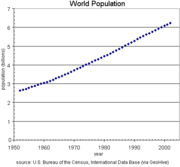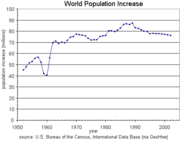World population
|
|
The world population is the total number of humans alive at a given time. According to estimates published by the United States Census Bureau, the world population in June 2005 was ~6,556,773,622. In line with population projections, this figure continues to grow at rates that are unprecedented prior to the 20th century. Approximately one fifth of all humans in the last six thousand years are currently alive. By some estimates, there are now one billion (thousand million) young people in the world between the ages of 15 and 24.
| Contents |
When was six billion reached?
The United Nations Population Fund designated October 12, 1999 as the approximate day on which world population reached six billion. This was about 12 years after world population reached five billion, in 1987. The child that has been proclaimed by the United Nations Population Fund and welcomed by the U.N. Secretary-General Kofi Annan as the six billionth baby, was born on the designated day two minutes after midnight, not in India or China, as might be expected, but to Fatima Nevic and her husband Jasminko in Sarajevo, Bosnia.
Rate of population increase
The last 70 years of the 20th century saw the biggest increase in the world's population in human history. The following table shows when each billion milestone was met:
- 1 billion reached in 1802.
- 2 billion reached in 1927.
- 3 billion reached in 1961.
- 4 billion reached in 1974.
- 5 billion reached in 1987.
- 6 billion reached in 1999.
From the figures above, the world's population has tripled in 72 years, and doubled in 38 years up to the year of 1999.
AreaPerCapita_500_BC_to_2050_AD.PNG
Including a few more estimates (beginning with 250 million in 950 and ending with 8 billion in 2027), the world population was doubled by the following years (doubling times in parentheses):
- 950 (650) 1600 (202) 1802 (125) 1927 (44) 1971 (56) 2027,
or (beginning with 375 million in 1420):
- 1420 (300) 1720 (155) 1875 (86) 1961 (38) 1999.
The UN estimated in 2000 that the world's population was then growing at the rate of 1.2 percent (or 77 million people) per year. This represents a decrease in the growth rate from its level in 1990, mostly due to decreasing birth rates.
As of 2004, the world's population is increasing at a rate of 75 million people per year.
Forecast of world population
The future growth of population is difficult to predict. Birth rates are declining slightly on average, but vary greatly between developed countries (where birth rates are often at or below replacement levels) and developing countries. Death rates can change unexpectedly due to disease, wars and catastrophes, or advances in medicine. The UN itself has issued multiple projections of future world population, based on different assumptions. Over the last 10 years, the UN has consistently revised its world population projections downward.
The current projections from the UN's Population Division, from their 2004 revision of the World Population Prospects database [1] (http://esa.un.org/unpp/), are:
| Year | Population (billions) |
|---|---|
| 2010 | 6.8 |
| 2020 | 7.6 |
| 2030 | 8.2 |
| 2040 | 8.7 |
| 2050 | 9.1 |
Other projections of population growth predict that the world's population will eventually crest, though it is uncertain exactly when or how. In some scenarios, the population will crest as early as the mid-21st century at under 10 billion, due to gradually decreasing birth rates.
In less optimistic scenarios, disasters triggered by a growing population's demand for scarce resources will cause a sudden population crash, or even a Malthusian catastrophe. (See overpopulation for more details.)
Doomsayers
In 1798, Thomas Malthus predicted that population growth would eventually outrun food supply, resulting in catastrophe. In 1968 Paul R. Ehrlich reignited this argument with his book The Population Bomb, which helped give the issue significant mindshare throughout the 1960s and 1970s. The dire predictions of Ehrlich and other neo-Malthusians were vigourously challenged by a number of economists, notably Julian Simon. Child poverty has been linked to people having children before they have the means to care for them.
More recently, some scholars have put forward the Doomsday argument applying Bayesian probability to world population to argue that the end of humanity will come sooner than we usually think (toxic waste rather than food shortages).
Different continents
World_population_evolution.png
Source: http://esa.un.org/unpp/ United Nations
The vertical axis of the chart above is in thousands. Likewise, the population figures in the table below are in thousands.
| Year | World | Africa | Asia | Europe | Latin-America | North America | Oceania |
|---|---|---|---|---|---|---|---|
| 1750 | 791000 | 106000 | 502000 | 163000 | 16000 | 2000 | 2000 |
| 1800 | 978000 | 107000 | 635000 | 203000 | 24000 | 7000 | 2000 |
| 1850 | 1262000 | 111000 | 809000 | 276000 | 38000 | 26000 | 2000 |
| 1900 | 1650000 | 133000 | 947000 | 408000 | 74000 | 82000 | 6000 |
| 1950 | 2518629 | 221214 | 1398488 | 547403 | 167097 | 171616 | 12812 |
| 1955 | 2755823 | 246746 | 1541947 | 575184 | 190797 | 186884 | 14265 |
| 1960 | 3021475 | 277398 | 1701336 | 604401 | 218300 | 204152 | 15888 |
| 1965 | 3334874 | 313744 | 1899424 | 634026 | 250452 | 219570 | 17657 |
| 1970 | 3692492 | 357283 | 2143118 | 655855 | 284856 | 231937 | 19443 |
| 1975 | 4068109 | 408160 | 2397512 | 675542 | 321906 | 243425 | 21564 |
| 1980 | 4434682 | 469618 | 2632335 | 692431 | 361401 | 256068 | 22828 |
| 1985 | 4830979 | 541814 | 2887552 | 706009 | 401469 | 269456 | 24678 |
| 1990 | 5263593 | 622443 | 3167807 | 721582 | 441525 | 283549 | 26687 |
| 1995 | 5674380 | 707462 | 3430052 | 727405 | 481099 | 299438 | 28924 |
| 2000 | 6070581 | 795671 | 3679737 | 727986 | 520229 | 315915 | 31043 |
| 2005 | 6453628 | 887964 | 3917508 | 724722 | 558281 | 332156 | 32998 |
| 2010 | 6830283 | 984225 | 4148948 | 719714 | 594436 | 348139 | 34821 |
| 2015 | 7197247 | 1084540 | 4370522 | 713402 | 628260 | 363953 | 36569 |
| 2020 | 7540237 | 1187584 | 4570131 | 705410 | 659248 | 379589 | 38275 |
| 2025 | 7851455 | 1292085 | 4742232 | 696036 | 686857 | 394312 | 39933 |
| 2030 | 8130149 | 1398004 | 4886647 | 685440 | 711058 | 407532 | 41468 |
| 2035 | 8378184 | 1504179 | 5006700 | 673638 | 731591 | 419273 | 42803 |
| 2040 | 8593591 | 1608329 | 5103021 | 660645 | 747953 | 429706 | 43938 |
| 2045 | 8774394 | 1708407 | 5175311 | 646630 | 759955 | 439163 | 44929 |
| 2050 | 8918724 | 1803298 | 5222058 | 631938 | 767685 | 447931 | 45815 |
External links
- World Population Prospects (http://esa.un.org/unpp/). Retrieved April 7, 2005.
- The World in Balance (http://www.pbs.org/wgbh/nova/transcripts/3108_worldbal.html) Transcript of two-part PBS' Nova on World Population
- BBC (1999). UN chief welcomes six billionth baby (http://news.bbc.co.uk/2/hi/in_depth/472704.stm). Retrieved March 6, 2005.
- Central Intelligence Agency (2004). CIA The World Factbook 2004 (http://www.cia.gov/cia/publications/factbook/geos/xx.html). Retrieved February 13, 2005.
- United Nations (2001). United Nations Population Information Network (http://www.un.org/popin/). Retrieved February 13, 2005.
- United States Census Bureau (2004). Historical Estimates of World Population (http://www.census.gov/ipc/www/worldhis.html). Retrieved February 13, 2005.
- PopulationData.net (2005). PopulationData.net - Informations and maps about populations around the world (http://www.populationdata.net).
- Population Reference Bureau www.prb.org - News and issues related to population (http://www.prb.org).
- World Population Clock (2005). WorldPopClock.com - World population clock (http://www.worldpopclock.com).
- Population Counter. See estimates of populations in various countries around the world and watch them get updated! China is the most active, so if you want to see what happens, just head straight for that densely populated country. (http://rumkin.com/tools/population/).
ca:Població mundial de:Weltbevölkerung fr:Population mondiale ja:ä¸çäººå£ nl:Wereldbevolking pl:Ludność świata tr:Dünya nüfusu



